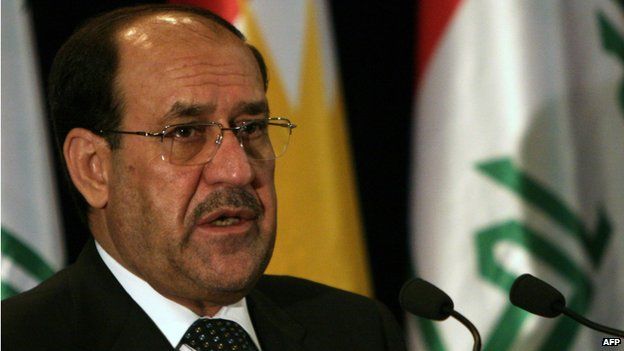How will the future of a sectarian ruler look like in a state where political assassinations are the norm?
Perhaps Al-Maliki will meet the fate of Yemen’s Ali Abdullah Saleh who was killed at the hands of the Houthis, his onetime allies.
Political assassinations have been the norm throughout the history of one-century-old Iraqi state. Fraught with sectarianism and conflicting ideologies, Iraq’s plagued with next-to-impossible peaceful political transition. Bullets, not ballots, are the only recognizable means in Iraq for gaining political power and governance. Iraq’s Nouri Al-Maliki, the ex-prime minister whose agenda centered on sectarianism, kleptocracy and loyalty to Iran, his political and ideological sponsor, will likely face the same fate. He is even on course to meet that fate. He was prime minister from 2006 to 2014. He was corrupt and sectarian. His rule ended with a scandal when ISIS extremists overran northern Iraq, capturing nearly one third of the country’s area and declaring their so-called caliphate.
But why such a question about the fate of Maliki could ever be raised. Simply because assassinations is an integral part of the political history of Iraq, under both the monarchy and dictatorial nationalist republics established in late 1950s and earlier 1960s.
Nouri Al-Said: Neither the first nor the last assassination
Nouri Al-Said, a monarchy-era former prime minister of Iraq, was born in 1888. He was considered a seasoned politician in Iraq. He was appointed as premier 14 times between 1930 and 1958. Al-Said began his career in the Ottoman Army as an officer. He participated in the Crimea War. Al-Said also took part in the uprising against Ottoman rule after his return from the war.
Particularly during his final years in office, Nouri Al-Said was a significant contributor to the development of Iraq’s foreign policy. In 1945, he played a major role in the creation of the Baghdad Pact, which included Pakistan, Iraq, Turkey, the UK, and Iran. He played a similar role in creating the Arab Federation, which included the kingdoms of Iraq and Jordan, four years later. Every action he took was intended to stem the tide of Arabist nationalism being pushed by Egyptian President Gamal Abdel-Nasser. He was certain that Iraq needed a world superpower to defend it. The revolutionary army officers who overthrew the monarchy in 1958 may have been enraged by this political stance. Al-Said’s efforts to curtail the growing Arabist republicanism didn’t bear fruit. The inevitable happened. The revolution broke out and Al-Said found himself prompted to flee.
Iraqi analysts claim that Al-Said consistently displayed disdain for the opposition and underestimated their capacity to unseat him. He insisted that the police could effectively handle the protests, which would number in the hundreds. He was always assured that Iraq would stay secure and safe. “The man who dares to kill me hasn’t even been born,” he once said.
On July 14, 1958, however, this assurance turned out to be a mirage. Colonel Abdul Salam Arif gave the order for his men to go to Nouri Al-home Said’s with a view of the Tigris River and take him into custody. Al-Said left his house in his pajamas after learning of the revolution. There are various accounts of how Al-Said left his home after the revolution began. In the end, Nouri, who had a 10,000 dinar bounty on his neck, captured and killed. According to one account, Al-Said was killed during a shootout with army officers. According to other accounts, he committed suicide to save himself from being humiliated by irate revolutionaries.
Al-Said’s assassination wasn’t the first on the Iraqi political landscape. It’s nearly a well-established principle: You will kill your predecessor; and your predecessor will kill you. This was the case with King Ghazi of Iraq. He was assassinated in 1939. Analyses suggest the assassination was carried out by the British occupation apparatuses. Less than two decades after this incident, the rest of the Iraqi royal family were killed in Qasr Al-Rihab massacre. After the Ottoman Empire fell, Faisal I established the kingdom of Iraq in 1932. Faisal, a Hashemite dynasty soldier who was born in Saudi Arabia, fought alongside T.E. Lawrence in World War I. Until his death at age 48 from a heart attack, Faisal ruled for 12 years under a constitutional monarchy imposed by the British.
When two army brigades were commanded to move to Jordan on July 13, 1958, to assist in resolving a crisis in Lebanon, Abdul Karim Qassim, a disgruntled officer commanding one of the units, saw his opportunity and dispatched troops to the Qasr Al Rihab Palace. They had tanks surrounding the palace by early the next morning when they started firing. King Faisal II, his uncle the crown prince, other royal family members, and their staff were ordered from the back entrance and killed shortly after 8 a.m.
Just the beginning
The killing of the Iraqi royal family didn’t end the country’s turmoil. According to Iraqi observers, the brutal assassination of the Iraqi royal family, including prime minister Nouri Al-Said, let loose the vortex of reckless political violence in the country. There were no trials or signs of legitimate enforcement of law. This reckless and uncontrolled violence turned into a tool employed by political forces to make political gains.
Ironically, Abdul Karim Qassim, who orchestrated the crime against the Iraqi royal family, was himself brutally assassinated by the Baathists and Nationalists in 1963. Moreover, his accomplice in the 1958 coup and the massacre against the Iraqi royal family, Abdul Salam Arif, carried out the assassination against him.
There were many more assassinations afterwards carried out by the Baathist regime until the fall of the Iraqi state in 2003. There’s no room to mention such assassinations here. But they have one apparent common denominator: They hurt both sides of the isle. For example, the two major contestants on the Iraqi arena now are the Sadrists, led by Shiite cleric Moqtada al-Sadr, whose father, Mohammad Baqir al-Sadr, was assassinated by the Saddam Hossein regime, and Nouri Al-Maliki, an affiliate with the Shiite majority that had been at loggerheads with the former Iraqi regime. In a previous televised interview, Nouri Al-Maliki alleged that the Saddam Hossein regime killed 60 of his family members.
Recent history
These assassinations aren’t something from the past. They have been continuing until very recently. On November 8, 2021, Iraqi Prime Minister Mostafa Al-Kazimi survived an assassination attempt. A drone attacked Al-Kadhimi’s residence. The attack was likely a message from his foes who objected to his domestic and foreign agenda.
Assassinating Iraq’s Nouri Al-Maliki, therefore, isn’t far-fetched. Given his devastating political legacy, bitter alliances with Sadr and other forces, his extremely sectarian convictions and schemes, Al-Maliki may be on course to meet the fate of former rulers of Iraq and the countless number of politicians and religious dignitaries. Perhaps Al-Maliki will meet the fate of Yemen’s Ali Abdullah Saleh who was killed at the hands of the Houthis, his onetime allies. Cunning politicians may be adept at dancing at snakes’ heads. But this doesn’t mean that they won’t be bitten by that snake one day. So, which snake will bite Al-Maliki? Let’s wait and see.
Mostapha Hassan Abdelwahab is the former editorial manager of the English edition of the Baghdad Post. He is focusing on Iraqi and Iranian affairs, with articles posted on the Herald Report, Vocal Europe and other platforms.


